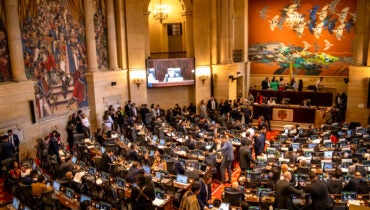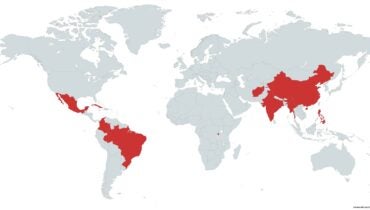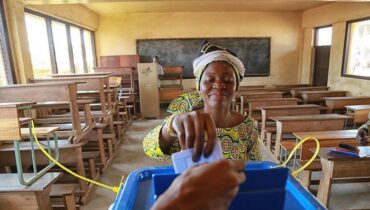For the first time in decades, a first lady of Afghanistan is engaged in her country’s public life. Mrs. Rula Ghani visited Georgetown University on February 19 for “Remarks by H.E. Mrs. Rula Ghani, First Lady of the Islamic Republic of Afghanistan” to speak about progress and opportunities for women in Afghanistan, as well as challenges for the future. Mrs. Ghani described viewing her role as a listener and facilitator in Afghanistan, and shared her ideas for empowering her country’s women, youth and Internally Displaced Persons (IDPs).
In September Mrs. Ghani became first lady when her husband Ashraf Ghani assumed the presidency after a five month election and recount process, which resulted in a unity government with Abdullah Abdullah. The role of first lady is not built into Afghanistan’s constitution, but Mrs. Ghani has built an office and a team of advisors to support her goals of connecting with the people and serving as a listener and facilitator for their ideas and concerns. She maintains an open door policy and has met with businesswomen and groups of young girls, among others.
“What I try to do is figure out what does the country need,” she said. “The country needs a lot of things…what is really wonderful is that we are at a turning point where we can start rebuilding the country.”
Mrs. Ghani spoke of former President Hamid Karzai as providing necessary stability in Afghanistan that is now the basis on which her husband can begin his reforms. She is most interested in support for IDPs, how citizens of Afghanistan view their culture and the role of women, and youth.
Addressing the needs of the IDPs is a pursuit that she said is “long-term and requires political will.” Mrs. Ghani spoke of the plight of people returning to their homes without jobs, and of children who work on the streets for the equivalent of $0.50 a day. She sees the necessity of moving people out of camps and building townships where everything will be available – schools, markets, clinics, mosques and factories to provide jobs.
On the important issue of the status of women in Afghanistan, Mrs. Ghani wants to reframe the discussion from one of “women’s rights” to one of the role of women within families. “I will not talk about it as ‘women’s rights,’” she said. “You rub the people the wrong way and get negative reactions. We have to be smart. We have to be clear about our goals but pursue them gently.”
Mrs. Ghani said that after 23 years of civil war and 13 years of international aid, “Afghans have forgotten what their culture was.” She left Afghanistan in 1977 and returned in 2002 to find many changes, including a degradation of how women are respected in the family. Mrs. Ghani recognized the importance of trying to increase women’s status within the family unit instead of separating them as a standalone group.
“My mother and my husband’s grandmother were formidable women,” she said. “They really ruled the roost. Their word was law in their household. [Afghans] do not have appreciation or respect for women anymore like that… Instead of seeing a woman as just an object, as an object of frustration or violence, a sexual object, women should regain their role.”
Mrs. Ghani discussed her concern of the disconnection of Kabul from the provinces; few educational and health services reach Afghanistan’s rural areas, and this needs to be remedied. She spoke about the critical importance of teachers, nurses, and midwives reaching the provinces for reducing maternal mortality and increasing girls’ school enrollment.
“Mortality has decreased, but we are still losing too many of these women and these babies,” she said. “Ideally, the goal should be to train local women to serve in these roles, not someone from Kabul. Most schools are being taught by men, and a lot of the families will not send their daughters.”
Mrs. Ghani said she has “no idea” whether women will be involved in any potential peace and reconciliation negotiations with the Taliban, but affirmed President Ghani’s commitment to women. “If peace and reconciliation with the Taliban happens, you can be sure that women won’t lose their rights,” she said. “My husband won’t allow that. But whether or not women will be the table, I don’t know.”
President Ghani promised to nominate four women for ministerial positions during his campaign, but only two were presented to Parliament before the winter break. Neither was confirmed. Mrs. Ghani asked the audience to think about the context in Afghanistan and said the upcoming female candidate for minister of women’s affairs, Najiba Ayubi, is terrific and has a strong chance of being confirmed.
Mrs. Ghani also attributed challenges facing youth in her country to years of war and dependence on foreign aid. Youth issues are especially important because over 60 percent of Afghanistan’s population is under the age of 25. “They’re totally lost,” she said. “They’ve known war, and then they’ve known the 13 preceding years where there has not really been an emphasis on civic duty…. Aid reinforces dependence. These young people are waiting for things to fall on their lap.” She said that a first step will be to reintegrate an emphasis of civic duty into school curriculums. Another key is a reframing of international aid from assistance to development. She sees development agencies as doing a good job when the program stays alive after they leave.
Mrs. Ghani ended her talk on a hopeful note, mentioning that many people – men and women, young and old – are now talking about the future of Afghanistan. “Eventually, we will have a country that isn’t perfect, but is very good living in,” she said.


